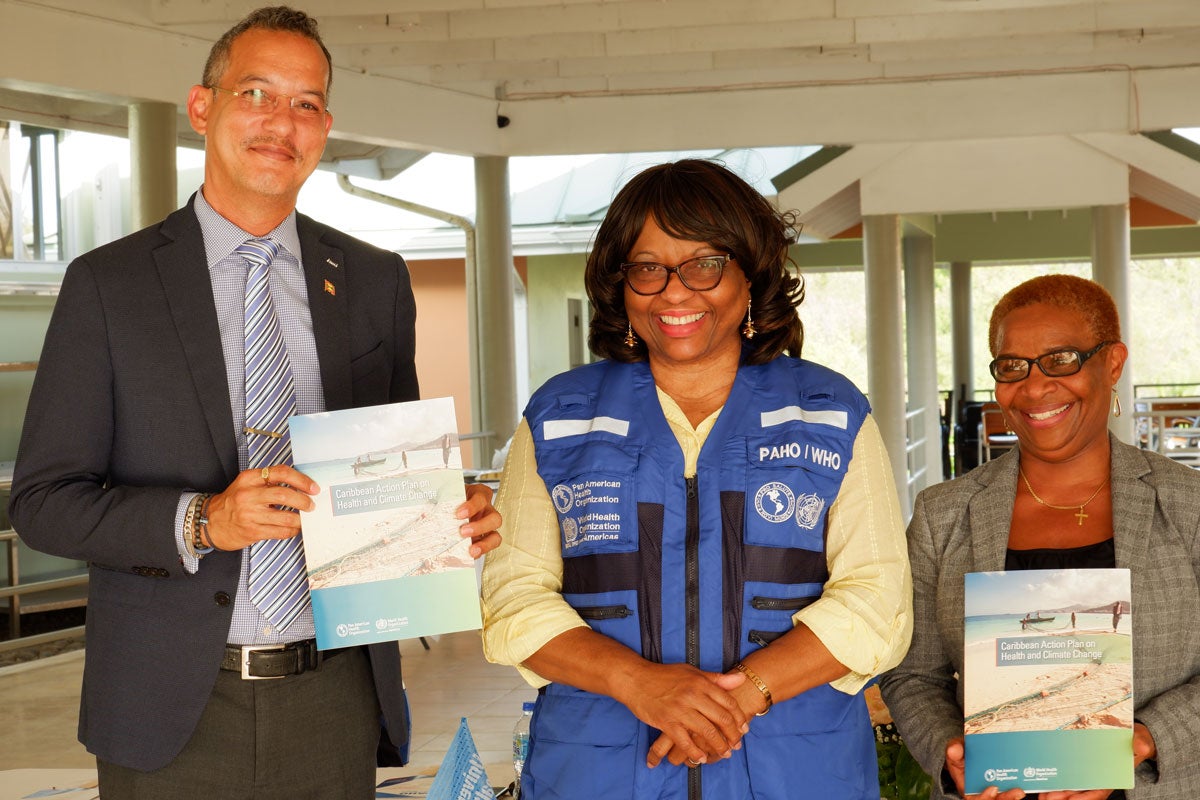
St. Lucia., 3 May 2019 (PAHO/WHO) – An Action Plan developed by countries and territories of the Caribbean, establishes a roadmap to ensure that health is front and center of national climate change planning in the Region.
The Caribbean Action Plan on Health and Climate Change focuses on protecting the health of Caribbean populations from the effects of climate change, such as heatwaves, storms, hurricanes, droughts, floods, outbreaks of disease, and other issues, by strengthening health systems, promoting intersectoral collaboration between the health and environment sectors, and increasing financing.
Climate change is one of the greatest threats to the future of our islands and the health of our people.
In order to achieve this, countries and territories of the Caribbean have agreed to take national and regional actions to strengthen educational and research capacities on climate change and health; to build climate-resilient health facilities throughout the Region; to improve health surveillance; and to develop weather and climate-related preparedness, response and recovery plans.
The Action Plan was launched on May 2 by the Director of the Pan American Health Organization (PAHO), Dr. Carissa F. Etienne, during a meeting with the Minister of Health of Grenada, Nickolas Steele, and other high-level officials in Comfort Bay Home for the Elderly, a facility that forms part of PAHO’s SMART initiative, supporting member states to become more climate resilient, in St. Lucia.

“Climate change is one of the greatest threats to the future of our islands and the health of our people,” said Dr. Etienne. “To this day, many islands are still recovering from hurricanes Harvey, Irma and Maria which, as we all know, caused devastation of epic proportions in 2017. It is our responsibility to place health in the climate change agenda.”
The plan is the regional outcome of the World Health Organization (WHO) and the United Nations Framework Convention on Climate Change’s (UNFCCC) Special Initiative on Climate Change and Health in Small Island Developing States. It was developed and approved during the Third Global Conference on Health and Climate Change: Special focus on Small Island Developing States in Grenada, in October last year, which was attended by 14 Caribbean Ministers of Health and Environment.
We know that there are funds available to promote climate resilience. We must ensure that health issues are included in every climate change project submitted to these funding mechanisms.
The Action Plan highlights the need to facilitate access to climate and health financing mechanisms and proposes a series of measures, including strengthening capacities and coordination to access resources at a regional level, and developing mechanisms to implement multi-country projects on climate change and health.
“We know that there are funds available to promote climate resilience. We must ensure that health issues are included in every climate change project submitted to these funding mechanisms,” said the Director of PAHO.
During the ceremony, Minister Steele thanked PAHO for its support and leadership in climate change and health and assured Dr. Etienne that he would continue to support the action plan and that he would encourage other governments in the Caribbean to do the same. He highlighted the experiences of Dominica, which show how years of development can be destroyed in just a few hours. For this reason it is vital that the Region acts now to become more resilient to climate change and protect future generations.
Dr. Etienne highlighted that due to its location, the Caribbean will likely continue to face increased exposure to climate-related disasters. Not only could these events have a direct impact on health systems and facilities, but they could also lead to “increased vulnerability to diseases; stress on freshwater supplies; and economic decline in vital sectors – such as tourism, agriculture and fisheries.”
The Director of PAHO emphasized that the organization stands ready to support countries to implement the actions proposed in the Caribbean Plan. “We have been working incessantly to provide capacity building and technical support for the development of Health National Adaptation Plans, to identify adaptation needs in the health sector, and to address health system vulnerabilities,” she said.
Protecting the health of Small Island States (SIDS)
The Special Initiative on Climate Change and Health in Small Island Developing States (SIDS), was launched in 2017 at the 23rd Conference of the Parties (COP-23) of the UNFCCC in Bonn, Germany. The initiative responds to requests by SIDS and recognized their unique vulnerabilities to climate change.
The initiative began with the III Global Conference on Health and Climate Change: Special Focus on SIDS, in 2018, which was held in the Pacific (Fiji), the Indian Ocean (Mauritius) and the Caribbean (Grenada).
The vision of the initiative is to ensure that by 2030, all SIDS health systems are resilient to climate variability and change.



